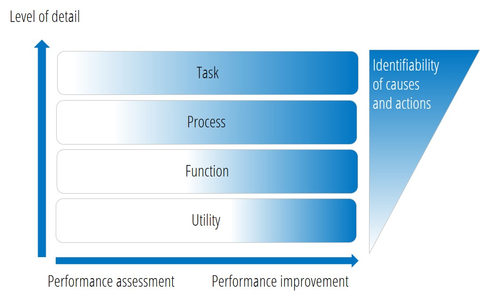Our method
We don't stop with figures; in fact that's where we start: Our benchmarking is intended to help you get to know the industry's most successful practices and to adopt them if necessary.
Steps
aquabench GmbH's benchmarking method has been in use for over 20 years now. It provides a generally usable management instrument to the drinking water and wastewater industry. Our project steps are based on recognised industry standards, in whose creation we have collaborated:
- "DVGW, DWA benchmarking guidelines for drinking water and wastewater disposal companies"
- DVGW data sheet W 1100/DWA M 1100 – Benchmarking in drinking water and wastewater services (withdrawn since 2018 and replaced by DIN ISO 24523)
- ISO 24523: 2017 "Service activities relating to drinking water supply systems and wastewater systems — Guidelines for benchmarking of water utilities“

Work steps and activities in benchmarking according to ISO 24523:2017
Our instruments
For data management
Data quality is the basis of all statements. That's what we work for. Automatically and through checking by experts. Professionals need clear definitions, relevant data and no double data acquisition.
- All performance indicators and definitions are developed or fine-tuned together with our participants.
- We support the data acquisition. We make manuals and further input aids available online. Where necessary, we instruct the participants on site.
- The aquabench online platform is conceived for the simple, secure and efficient handling of your data and is under continuous development.
- Only plausible comparison data should reach our customers. The plausibility check is an own phase of our projects – with automatic and individual checks, queries and plausibility sessions on site.
- Ensuring the confidentiality of company data is the prerequisite for productive working with data. For operational optimisation the data are disclosed in the workshops with the permission of the participants in order to identify innovative approaches. In all written reports we pass on the data only in anonymised form. That creates trust and security.
For operational optimisation
The elaboration of benchmarking results and their integration into the operational reality necessitate highly individual decisions in the companies and are dependent on their respective goals and framework conditions. We work with instruments for this:
- In our workshops you are given the opportunity to discuss, query and interpret. This is where networks are created and where the successful practices of other partners are put on the test bench.
- Our individual reports provide you with the greatest possible transparency. They document all performance indicators, input values and definitions – in graphic and tabular form. In addition, we simplify it for you and summarise what's most important at a glance.
- You can control the evaluation of your data yourself with our software, the aquabench online platform. Which performance indicator is suitable for you? Which comparison group is suitable for you?
- As the last component of the jointly executed project, we document the action options elaborated in order,
- to determine how (and whether) the results can be put specifically to use;
- to document the success of the project and make it measurable.
- We support those who want to go further with the analysis and the integration of the results into their procedures in individual discussions and presentations (usually optional, i.e. supplementary to the benchmarking procedure).
For communication
- Our reports support our participants. Executive board and managerial staffs are guided quickly and clearly to the most important statements. Those responsible for the project receive detailed access to all backgrounds in order to evaluate statements independently and to analyse them in greater depth.
- Committees and the general public often want to get an idea of the results themselves. We support that with individual presentations or own reports individually created for target groups.
- The performance of the operations is often measured by the local, regional and national government or the general public by the level of the fees and prices. Many operators pick up on this desire for transparency and actively communicate the correlation between the level of the fees and performances in the industry. With the "price and fee transparency", the openness necessary to be able to discuss the backgrounds, framework conditions and comparability of the fees is created in a factual and well-founded manner with all participants.
For more information on „price and fee transparency“ see our German website
Various application levels
Benchmarking at utility and process level
Benchmarking can be applied at different levels, in particular as benchmarking at utility level and as benchmarking at process level.

The comparison of entire companies or businesses takes place at the top, most aggregated level (benchmarking at utility level). For example, the entire wastewater disposal or the entire supply of water is compared with other companies. The bases for this are recognised process models from the corresponding drinking water or wastewater standards from DVGW, DWA and IWA. Benchmarking at utility level is thus particularly suitable for owners, communities and works managements/executive boards.
In benchmarking at process level the method is applied at differently defined processes. This often concerns entire plant sections (operation of waterworks, wastewater treatment plants, pumping stations, networks) or deeper lying (sub-) processes such as "manufacture house connection", "sewer cleaning" or "monitor industrial discharger". The bases are finely tuned process models. Target groups are above all else the managerial staffs responsible for the process.
The methods differ in their degree of detail. As the depth of detail grows, so too do
- the characteristics and composition of the recommended actions
- the accuracy of the findings and
- the circle of addressees
Individual check
Our many years of experience in virtually all water resources management processes enable us in the meantime to offer essential components of the benchmarking individually too (without a group of simultaneously participating comparison companies).
The advantage of that for you is that you can determine the course of the project yourself. In addition, the aquabench advisers concentrate exclusively on you. Our reference and empirical values are thereby naturally at your disposal.
Exchange of experiences ("Knowledge Picnic")
So-called experience exchange rounds use parts of the successful benchmarking methodology, in particular from the area of network formation and the workshops. Performance indicators do not claim to capture processes completely, but they specifically support aspects of the structured and goal-oriented exchange of experiences ("Knowledge Picnic") between participants.
